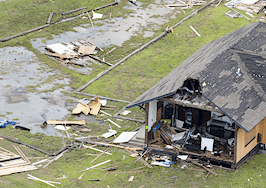While mortgage payment delinquencies are generally down across the country, they were explainably up in states hit by Hurricanes Irma and Harvey, resulting in a slightly raised annual delinquency rate, according to the October 2017 Black Knight Mortgage Monitor.
Irma and Harvey can be blamed for a total of 229,000 “past due” loans, which represent 10 percent of the country’s delinquent loan population, said the report.
Loans in foreclosure, meanwhile, dipped below 350,000 for the first time since 2006, to 0.68 percent.
While nationwide delinquencies fell in every state apart from Florida and Texas, in FEMA-declared disaster areas delinquencies were up 24 percent, according to Black Knight’s First Look mortgage data. And in hurricane-affected parts of Florida, delinquencies were up an extra 36 percent since September.
While further increases are expected in November, the report noted that conditions should improve as homeowners receive their insurance payouts in the coming months.
Black Knight has also done special research on Puerto Rico’s recovery from hurricane season by comparing the U.S. territory’s experience to the effect Katrina had on parts of Louisiana and Mississippi in 2005. On the island more than one in five homeowners who were previously up to date on mortgage payments are now falling behind, pushing the delinquency rate up to 32 percent. Puerto Rico has seen 90,000 mortgages become past due since the storm.
HUD reaches out to hurricane-hit homeowners
Meanwhile the Department of Housing and Urban Development (HUD) and the Texas General Land Office today launched a public awareness campaign to help struggling homeowners affected by Hurricane Harvey avoid foreclosure and finance repairs to their storm-damaged homes.
Texans having trouble meeting their mortgage payments were directed to service providers or the Federal Housing Administration (FHA) Resource Center with questions.
The FHA, which insures one quarter of the home loans in Texas, where a total of one million homes were damaged or destroyed by Harvey, has extended its 90-day foreclosure moratorium to February 21, 2018 to FEMA-designated individual assistance areas in the Presidentially Declared Major Disaster Areas (PDMDAs). FHA-insured homeowners may qualify for this relief if they live or work in a PDMDA.
HUD also gave a number of other options designed to help households whose finances were affected by the disaster and recommended people with questions contact HUD -approved housing counselors to help connect them to the relevant options for them.
Implications of new tax reform bill for housing
In its October mortgage report Black Knight also had some interpretations of what effect tax reform would have on the housing market. It suggested that the biggest implications for homeowners and buyers would be changes in the mortgage interest deduction (MID) and capital gains exemptions, which it said would do no favors for current tight inventory conditions.
It said that the moderate to expensive home markets would be most affected by changes in the MID, which is well used in these markets. The Black Knight Home Price Index shows 22 markets nationwide where the median home is over $500,000.
At this point the House tax bill reduces the MID from $1 million to $500,000 while the Senate version puts the cap at $1 million. Black Knight estimates the cap would cost the average homeowner with more than a $500,000 mortgage an additional $2,600 to $4,200 per year depending on their tax bracket.
“If home prices continue to rise and the cap is left in place, the risk of more ‘average’ families being impacted will continue to grow,” the report noted.
On capital gains exemptions, both the House and Senate proposals extend ownership requirements from five to eight years and stipulate that homeowners can only use the tax-free provision once every five years. Black Knight data found that in the past two years, more than 14 percent of property sales were made by people selling in the two-to-five-year category.








